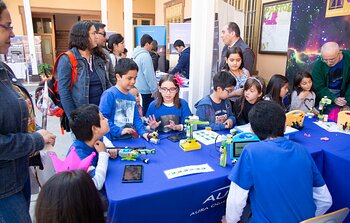AstroDay Chile Returns in 2023 with Exciting In-Person Activities
March 17, 2023
NSF NOIRLab invites you to participate in a series of fun, educational activities to celebrate the National Day of Astronomy in Chile

After two consecutive years of virtual activities, AstroDay Chile, organized by NSF’s NOIRLab, returns as an in-person celebration on Friday 24 March, the National Day of Astronomy in Chile, with fun activities for the whole family at the Colegio Seminario Conciliar in La Serena, Chile.
AstroDay Chile events start at 3 p.m. CLT and will continue until 9 p.m. CLT, culminating with an open star party when participants will have the chance to observe the wonders of the night sky.
During the day, the public will be able to interact with scientists and staff from the various scientific sites in Chile, including the International Gemini Observatory, Cerro Tololo Inter-American Observatory, Vera C. Rubin Observatory, SOAR Telescope, and Las Campanas Observatory, as well as with representatives of the tourist observatories of Mamalluca, Alfa Aldea, Chakana, Collowara, IntiWasi, Cruz del Sur, and Daniel Verschatse.
This year’s event will enable visitors to learn about the activities of the observatories and their exploration of the Universe. It also will include representatives of astronomy and environmental organizations.
Prominent guests at this event will include staff from the Universidad de La Serena and Universidad Central, who will share their science and astronomy community collaborations. This will also give students the opportunity to learn about potential future opportunities for working with the next-generation of large telescopes.
The Corporación Municipal Gabriel González Videla, which manages public schools in La Serena, will also hold demonstrations using two mobile digital planetariums, allowing families to travel through the Universe without the need of a space suit.
Carnegie Institution for Science will also share its well-known Mobile Laboratory called Conciencia Astronomía with which kids will be able to conduct simple experiments to learn about the motion of the Earth, the properties of light, the phases of the Moon, and other exciting discoveries of science.
The Office for the Protection of Sky Quality in Northern Chile (OPCC in Spanish), which oversees the quality of the night sky in northern Chile, will be participating in the fair to highlight the importance of using the correct lighting fixtures to benefit of the environment, human health, economics, scientific research and the enjoyment of dark skies.
Come learn about the latest advances in astronomy and celebrate with us the wonders of the Universe.
More information
NSF’s NOIRLab (National Optical-Infrared Astronomy Research Laboratory), the US center for ground-based optical-infrared astronomy, operates the International Gemini Observatory (a facility of NSF, NRC–Canada, ANID–Chile, MCTIC–Brazil, MINCyT–Argentina, and KASI–Republic of Korea), Kitt Peak National Observatory (KPNO), Cerro Tololo Inter-American Observatory (CTIO), the Community Science and Data Center (CSDC), and Vera C. Rubin Observatory (operated in cooperation with the Department of Energy’s SLAC National Accelerator Laboratory). It is managed by the Association of Universities for Research in Astronomy (AURA) under a cooperative agreement with NSF and is headquartered in Tucson, Arizona. The astronomical community is honored to have the opportunity to conduct astronomical research on Iolkam Du’ag (Kitt Peak) in Arizona, on Maunakea in Hawai‘i, and on Cerro Tololo and Cerro Pachón in Chile. We recognize and acknowledge the very significant cultural role and reverence that these sites have to the Tohono O'odham Nation, to the Native Hawaiian community, and to the local communities in Chile, respectively.
Links
Contacts
Manuel Paredes
NOIRLab Outreach Manager Chile
Email: manuel.paredes@noirlab.edu
Juan Seguel
NOIRLab Education and Engagement Specialist
Email: juan.seguel@noirlab.edu

